

What’s next for deep sea mining? Deep-sea mining 'must responsibly respect ecosystems' 17 February 2014Last updated at 06:12 ET By Jonathan Amos Science correspondent, BBC News, Chicago Elements such as lanthanum are in high demand for use in hybrid car batteries Scientists have made an impassioned plea for humanity to pause and think before making a headlong rush to exploit the deep sea.
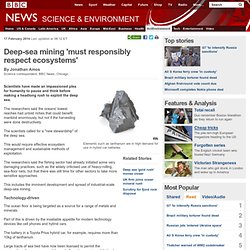
Deep Sea Mining. Background - March 20, 2014 Biologists estimate that somewhere between 500,000 and 5,000,000 marine species have yet to be discovered.
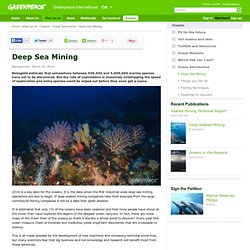
But the rate of exploitation is massively outstripping the speed of exploration and some species could be wiped out before they even get a name. 2016 is a key date for the oceans. It is the date when the first industrial scale deep sea mining operations are due to begin. If deep seabed mining companies take their example from the large commercial fishing companies it will be a date that spells disaster.
It is estimated that only 1% of the oceans have been explored and that more people have stood on the moon than have explored the depths of the deepest ocean canyons. This is all made possible by the development of new machines and increasing technical know-how, but many scientists fear that big business and not knowledge and research will benefit most from these advances. But all is not lost. China's nuclear powered ocean floor mining station drills for oil, gold.
Somehow, I think someone will find something objectionable in this one.
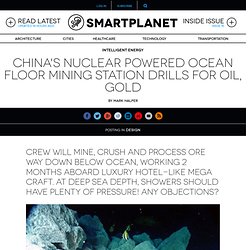
But talk about thinking big. China plans nuclear deep-sea mining base. A Chinese company is set to build a nuclear-powered mobile deep-sea station in the western Pacific, according to local reports.
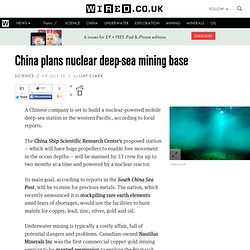
The China Ship Scientific Research Centre's proposed station -- which will have huge propellers to enable free movement in the ocean depths -- will be manned by 33 crew for up to two months at a time and powered by a nuclear reactor. Its main goal, according to reports in the South China Sea Post, will be to mine for precious metals. The nation, which recently announced it is stockpiling rare earth elements amid fears of shortages, would use the facilities to hunt mainly for copper, lead, zinc, silver, gold and oil. Underwater mining is typically a costly affair, full of potential dangers and problems. Deep-sea Mining Technology Is Going To Boom In China. With th edevelopment of contemporary society, increasingly more energy is consumed, thus we have to explore more energy for that a long time.
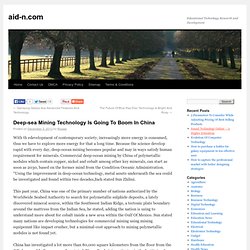
Because the science develop rapid with every day, deep-ocean mining becomes popular and may in ways satisfy human requirement for minerals. Deep sea mining. Deep sea mining is a relatively new mineral retrieval process that takes place on the ocean floor.
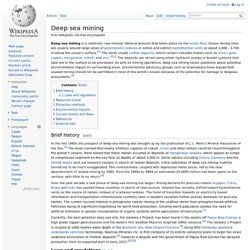
Ocean mining sites are usually around large areas of polymetallic nodules or active and extinct hydrothermal vents at about 1,400 - 3,700 m below the ocean’s surface.[1] The vents create sulfide deposits, which contain valuable metals such as silver, gold, copper, manganese, cobalt, and zinc.[2][3] The deposits are mined using either hydraulic pumps or bucket systems that take ore to the surface to be processed. As with all mining operations, deep sea mining raises questions about potential environmental impact on surrounding areas.
Environmental advocacy groups such as Greenpeace have argued that seabed mining should not be permitted in most of the world's oceans because of the potential for damage to deepsea ecosystems.[4] Brief history[edit] China is building a new deep-sea mining base conveniently near a military naval fleet - Quartz. China announced today that a multi-million dollar deep-sea base will be built off its eastern coast in 2013.
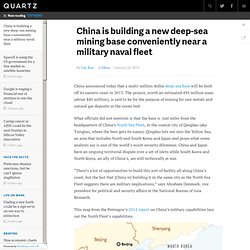
The project, worth an estimated 495 million yuan (about $80 million), is said to be for the purpose of mining for rare metals and natural gas deposits in the ocean bed. What officials did not mention is that the base is just miles from the headquarters of China’s North Sea Fleet, in the coastal city of Qingdao (aka Tsingtao, where the beer gets its name). Qingdao lets out into the Yellow Sea, an area that includes North and South Korea and Japan and poses what some analysts say is one of the world’s worst security dilemmas. China and Japan have an ongoing territorial dispute over a set of islets while South Korea and North Korea, an ally of China’s, are still technically at war. Britain plunges into deep sea mining with American company. Britain's prime minister announced Thursday the country would partner with an American company to mine the depths of the Pacific Ocean for metals and rare earth minerals, reports the Guardian.
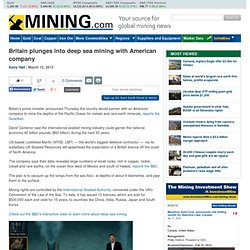
David Cameron said the international seabed mining industry could garner the national economy 40 billion pounds ($60 billion) during the next 30 years. US-based Lockheed Martin (NYSE: LMT) — the world's biggest defence contractor — via its subsidiary UK Seabed Resources will spearhead the exploration of a British licence off the coast of North America. The company says their data revealed large numbers of small rocks, rich in copper, nickel, cobalt and rare earths, on the ocean floor west of Mexico and south of Hawaii, reports the BBC.